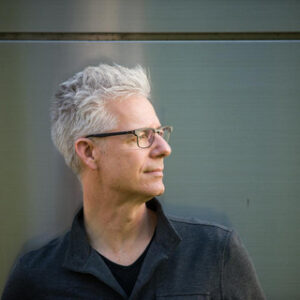T. PATRICK CARRABRÉ
 T. Patrick Carrabré is a Métis composer living in Vancouver. Construction of identity and community engagement are long-term themes in his compositions, artistic programming, and administrative activities. His best known works include Inuit Games, for katajjak (throat singers) and orchestra, which was a recommended work at the International Rostrum of Composers (2003), Sonata No. 1, The Penitent, for violin and piano, and From the Dark Reaches, which were nominated for JUNO awards. In 2021 he was recognized with a second Western Canadian Music Award (Classical Composer of the Year) for the album, 100,000 Lakes. Other recent work includes Métis Songs, commissioned by Harbourfront for Rebecca Cuddy and the Wood and Wire String Quartet and Snewíyalh tl’a Staḵw (Teachings of the Water), written in collaboration with the Elektra Women’s Choir. Orpheus (1), written in collaboration with pianist Megumi Masaki – was released on the Centredisc label in March 2023 and and EP of Métis Songs was released in September 2024 on Winter Wind Records.
T. Patrick Carrabré is a Métis composer living in Vancouver. Construction of identity and community engagement are long-term themes in his compositions, artistic programming, and administrative activities. His best known works include Inuit Games, for katajjak (throat singers) and orchestra, which was a recommended work at the International Rostrum of Composers (2003), Sonata No. 1, The Penitent, for violin and piano, and From the Dark Reaches, which were nominated for JUNO awards. In 2021 he was recognized with a second Western Canadian Music Award (Classical Composer of the Year) for the album, 100,000 Lakes. Other recent work includes Métis Songs, commissioned by Harbourfront for Rebecca Cuddy and the Wood and Wire String Quartet and Snewíyalh tl’a Staḵw (Teachings of the Water), written in collaboration with the Elektra Women’s Choir. Orpheus (1), written in collaboration with pianist Megumi Masaki – was released on the Centredisc label in March 2023 and and EP of Métis Songs was released in September 2024 on Winter Wind Records.
TEACHINGS OF THE WATER - (Snewíyalh tl'a Staḵw)
by T. Patrick Carrabré
SSAA a cappella – CP 2313 – duration 2:45
Snewíyalh tl’a Staḵw (Teachings of the Water) is an 18-minute, five-movement a cappella work in the Squamish language that was recorded and released by Elektra in 2022 as a music video. The fruit of a 3-year collaborative project with First Nations, it was conceived by Co-Curator and ethnomusicologist, Dr. Jeanette Gallant (B.Mus. UBC, D.Phil. Oxford), the project is a musical exploration of water teachings in British Columbia First Nations cultures. The music can be performed without the visual elements and would be well-suited to other multi-media expressions such as dance. It was also created with the idea in mind that a choir could work with its own local Indigenous people and change the text to that nation’s language. I would be thrilled to hear of such adaptations and relationship-building.
The movements are available individually or as a complete set:
1) Ḵeḵsín ti syatshn (The Natural World) – duration 2:45
2) Kwis na xwey (Birth) – duration 2:45
3) Shúkw’em (Ceremony) – duration 4:30
4) Slúlum (Song) – duration 4:30
5) Úxwumixw (Identity) – duration 3:40
COMPLETE SET (5 Movements) – click here
Notes – courtesy of Dr. Jeanette Gallant
1. Keksín ti syatshn (The Natural World): The meaning of the title (all of us in the same basket) reveals our relationship to one another, while the text eslhelhá7kwhiws (how everything is connected) shows that we are also related to the natural world. Water nourishes the land, and the land gives us medicine. Rivers and creeks are like our veins – they carry water to the heart of the earth and nurture the plants and animals.
Métis composer T. Patrick Carrabré was commissioned to write the musical score with text in the Squamish language chosen, gifted, and taught to Elektra by Rebecca Duncan.
This was a reconciliation project by Elektra. I strongly encourage you to watch not only the 28-minute music video but also the Listener’s Guide, which gives great depth of cultural context and explains our process. These and a 17-minute Squamish Language Pronunciation Guide will be available permanently and free on the Elektra YouTube channel.
Jeanette Gallant and Mi’kmaq filmmaker Shelley MacDonald created the storyboard, and filmmaker Mike Southworth of Collide Entertainment accompanied the choir to various Metro Vancouver locations as guests from the Coast Salish and Interior Salish cultures shared their knowledge and world views on the importance of water and the role of Indigenous women water stewardship.
Don Harder and Grant Rowledge captured the audio recording, following which Southworth directed the creation of the video. Each movement is introduced by one of Elektra’s First Nations collaborators in terms of what water teaches about relationships to the land, each other, and to ourselves.
Elektra is grateful in the creation of this work for the contributions and indigenous teachings of Rebecca Duncan (Tsitsáyxemaat), Squamish; Mary Jane Joe (Nk’xetko), Interior Salish, Elder; Nadia Joe, Interior Salish (Mother’s side) and southern Tutchone-Tlingit, specifically the Crow Clan of the Champagne and Aishihik First Nations (Father’s side); Candice Halls-Howcroft, Squamish; Faye Halls (Yeltsilewet), Squamish, Elder; Shelley MacDonald, Mi’kmaq “Ugpi’Ganjig” (Eel River) and Scottish; Harrison Dobos (Binkïca), Champagne and Aishihik; Cheyenne Halls-Howcroft, Squamish; and Bob Baker (S7aplek), Squamish, Elder.

